A person having osteoporosis is suffering from lead poisoning. Ethlene diamine tetra acetic acid (EDTA) is administered for this condition. The best form of EDTA to be used for such administration is -
EDTA
tetrasodium salt
disodium salt
calcium dihydrogen salt
The correct Answer is:D
Step by step video & image solution for A person having osteoporosis is suffering from lead poisoning. Ethlene diamine tetra acetic acid (EDTA) is administered for this condition. The best form of EDTA to be used for such administration is - by Chemistry experts to help you in doubts & scoring excellent marks in Class 12 exams.
Updated on:21/07/2023Topper's Solved these Questions
- COORDINATION COMPOUNDSBOOK - RESONANCE ENGLISHCHAPTER - COORDINATION COMPOUNDSEXERCISE - Additional Problem for Self Practice (APSP) Part-III Subjected Question
7 Videos
- COORDINATION COMPOUNDSBOOK - RESONANCE ENGLISHCHAPTER - COORDINATION COMPOUNDSEXERCISE - Additional Problem for Self Practice (APSP) Part-III Only one option correct type
20 Videos
- COORDINATION COMPOUNDSBOOK - RESONANCE ENGLISHCHAPTER - COORDINATION COMPOUNDSEXERCISE - Additional Problem for Self Practice (APSP) Part-I
29 Videos
- CHEMISTRY IN EVERYDAY LIFEBOOK - RESONANCE ENGLISHCHAPTER - CHEMISTRY IN EVERYDAY LIFEEXERCISE - ORGANIC CHEMISTRY(Chemistry in every day life)
31 Videos
- D & F BLOCK ELEMENTSBOOK - RESONANCE ENGLISHCHAPTER - D & F BLOCK ELEMENTSEXERCISE - ORGANIC CHEMISTRY(Aldehydes , Ketones, Carboxylic acid)
15 Videos
Similar Questions
Ethylenediamine tetraacetic acid, EDTA in the form of its calcium dihydrogen salt, is administered as an antidote for lead poisoning. Explain why this reagent might be an effective medicine. Why is the calcium salt administrated rather than the free acid
View SolutionThe ciliary muscles of eye control the curvature of the lens in the eye and hence can alter the effective focal length of the system. When the muscles are fully relaxed, the focal length is maximum. When the muscles are strained, the curvature of lens increases. That means radius of curvature decreases and focal length decreases. For a clear vision, the image must be on the retina. The image distance is therefore fixed for clear vision and it equals the distance of retina from eye lens. It is about 2.5cm for a grown up person.
A perosn can theoretically have clear vision of an object situated at any large distance from the eye. The smallest distance at which a person can clearly see is related to minimum possible focal length. The ciliary muscles are most strained in this position. For an average grown up person, minimum distance of the object should be around 25cm.
A person suffering from eye defects uses spectacles (eye glass). The function of lens of spectacles is to form the image of the objects within the range in which the person can see clearly. The image o the spectacle lens becomes object for the eye lens and whose image is formed on the retina.
The number of spectacle lens used for th eremedy of eye defect is decided by the power fo the lens required and the number of spectacle lens is equal to the numerical value of the power of lens with sign. For example, if power of the lens required is +3D (converging lens of focal length 100/3cm ), then number of lens will be +3.
For all the calculations required, you can use the lens formula and lensmaker's formula. Assume that the eye lens is equiconvex lens. Neglect the distance between the eye lens and the spectacle lens.
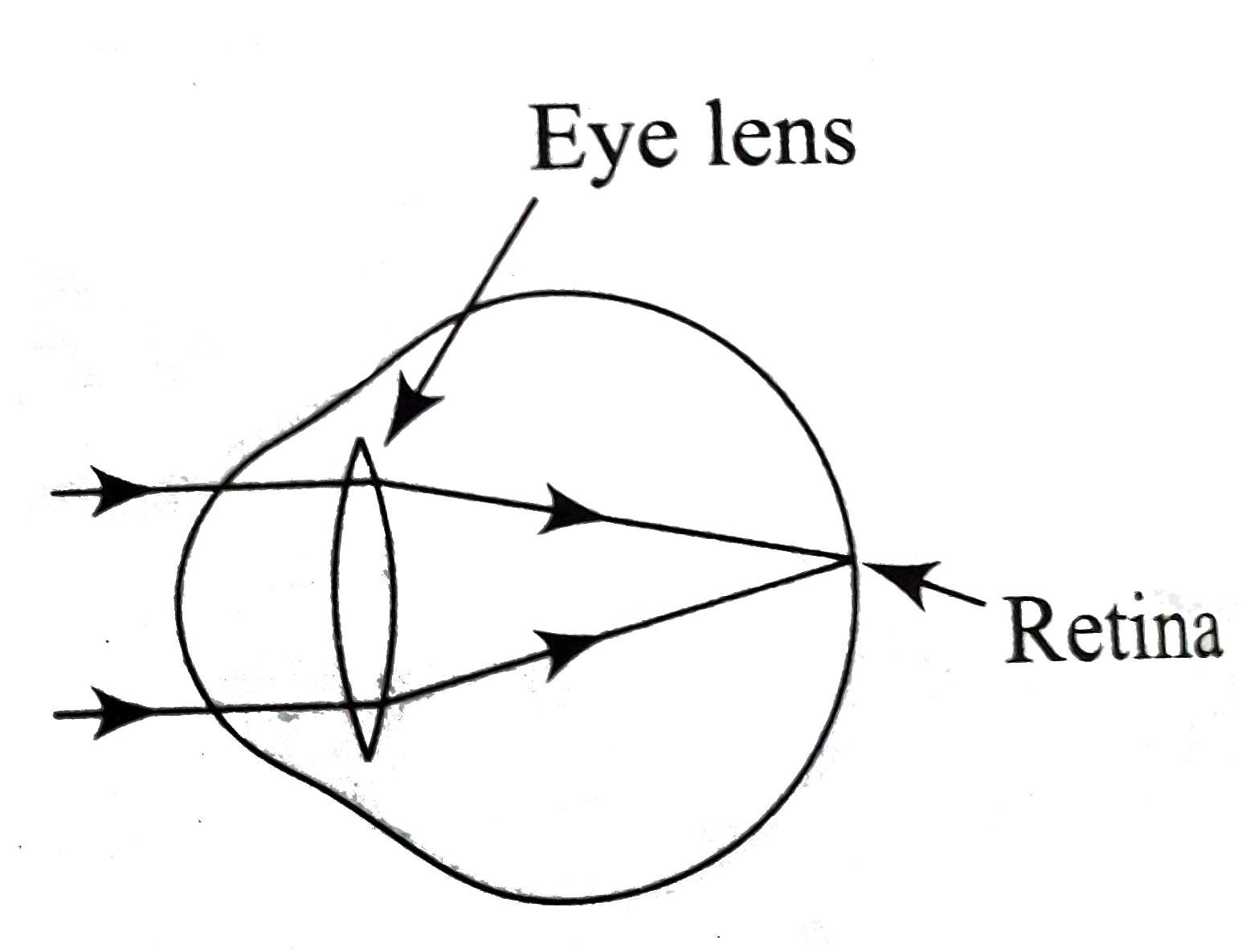
Q. A person can see objects clearly from distance 10cm to ∞. Then, we can say that the person is
View Solution
Knowledge Check
At this moment in America the aspects of political society absorb attention. In every house, form canda to the gulf, the children ask the serious father, -" What is the news of the war today and when will there be better times? The boys have no new clothers, no gifts, no juo0urneys, the girls must go without new bonnets, boys and girls find their education, this year, less liberal and complete. All the little hopes that heretofore made the year pleasant are deferred. the state of the country fills us with anxiety and stern duties. We have attempted to hold together two states of civilzation, a higher state, where labor and the tenure of land and the right of suffrage are democratical, and a lower state, in which the old military tenure of prisoners or slaves and of power and land in a few hands, makes an oligarchy, we have attempted to hold these two states of society under one law. But the rude and early state of society does not work well with the later nay, works badly and has poisoned politics, public morals and social intercourse in the Republic now for many years. the times put this question, Why cannot the best civilzation be extended over the whole country, since the disorder of the less civilization be extended over the whole country, since the disorder of the less civilized portion menaces the existence of the country Is this secular progres we have described, this evolution of man to the highest powers, only to giv ehim sensibility, and not to bring duties with it is he not to make his knowledge practical to stand and to withstand Is not civilzation heroic also is it not for action has it not a will america is another word for opportunity. Our whole history appears lke a last effort of the Divine providence onbehalf of the human race, and a literal slavish following of precedents, as by a justice of the peace, is not for those who at this hour lead te destinies of this people. the evil you contend with has taken alarmig proportions, and you still content yourself with parrying the blows it aims, but, as if enchanted abstain from striking at the cause. {..} Emancipation is the demand of civilization. That is a principle, everything else is an intrigue. This ais a progressive policy, puts the whole people in healthy, productive, amiable position, puts every man in the south in just and natural relations with every man in the north, laborer with laborer. the power of Emancipation is this, that if alters the atomic social constitution of the Southern people. Now their interest is in keeping out white labor, then, when they must pay wages, their interest wil by to let it in , to get the best labor, and , if they fear their lbacks, to inite irish, German and american laborers. Thus, whilst slavery makes and keeps disunion, emancipation removes the whole objection to union. Emancipation at one stroke elevates the poor white of the south, and identifies his interest with that of the northern laborer. [..] The end of all political struggle is to establish morlity as the basis of all legislation. It is not free institutions, tis not a epublic, tis not a democracy, that is the end, no, but only the means. Morality is the object of government. We want a state of things in which crime shall not pay . This is the consolation on which we rest in the darness of the future and the afflictions of today, that the government of the world is moral, and does forever destroy what is not.
(Q) 32/ What is the general porpose of this passageATo argue in favor of emancipationBto illustrate the evils of slaveryCto highlight the economic problems in the southDto articulate a comprehensive theory of moralityAt this moment in America the aspects of political society absorb attention. In every house, form canda to the gulf, the children ask the serious father, -" What is the news of the war today and when will there be better times? The boys have no new clothers, no gifts, no juo0urneys, the girls must go without new bonnets, boys and girls find their education, this year, less liberal and complete. All the little hopes that heretofore made the year pleasant are deferred. the state of the country fills us with anxiety and stern duties. We have attempted to hold together two states of civilzation, a higher state, where labor and the tenure of land and the right of suffrage are democratical, and a lower state, in which the old military tenure of prisoners or slaves and of power and land in a few hands, makes an oligarchy, we have attempted to hold these two states of society under one law. But the rude and early state of society does not work well with the later nay, works badly and has poisoned politics, public morals and social intercourse in the Republic now for many years. the times put this question, Why cannot the best civilzation be extended over the whole country, since the disorder of the less civilization be extended over the whole country, since the disorder of the less civilized portion menaces the existence of the country Is this secular progres we have described, this evolution of man to the highest powers, only to giv ehim sensibility, and not to bring duties with it is he not to make his knowledge practical to stand and to withstand Is not civilzation heroic also is it not for action has it not a will america is another word for opportunity. Our whole history appears lke a last effort of the Divine providence onbehalf of the human race, and a literal slavish following of precedents, as by a justice of the peace, is not for those who at this hour lead te destinies of this people. the evil you contend with has taken alarmig proportions, and you still content yourself with parrying the blows it aims, but, as if enchanted abstain from striking at the cause. {..} Emancipation is the demand of civilization. That is a principle, everything else is an intrigue. This ais a progressive policy, puts the whole people in healthy, productive, amiable position, puts every man in the south in just and natural relations with every man in the north, laborer with laborer. the power of Emancipation is this, that if alters the atomic social constitution of the Southern people. Now their interest is in keeping out white labor, then, when they must pay wages, their interest wil by to let it in , to get the best labor, and , if they fear their lbacks, to inite irish, German and american laborers. Thus, whilst slavery makes and keeps disunion, emancipation removes the whole objection to union. Emancipation at one stroke elevates the poor white of the south, and identifies his interest with that of the northern laborer. [..] The end of all political struggle is to establish morlity as the basis of all legislation. It is not free institutions, tis not a epublic, tis not a democracy, that is the end, no, but only the means. Morality is the object of government. We want a state of things in which crime shall not pay . This is the consolation on which we rest in the darness of the future and the afflictions of today, that the government of the world is moral, and does forever destroy what is not.
(Q) 35. Lines 6-9 (" the boys .. complete" ) most clearly indicate thatAinterests in childhood entertainment changed greatlyBwar led to a focus on the bare necessitiesCchildren became less interested in stimulationDemancipation was not a priority for the youngAt this moment in America the aspects of political society absorb attention. In every house, form canda to the gulf, the children ask the serious father, -" What is the news of the war today and when will there be better times? The boys have no new clothers, no gifts, no juo0urneys, the girls must go without new bonnets, boys and girls find their education, this year, less liberal and complete. All the little hopes that heretofore made the year pleasant are deferred. the state of the country fills us with anxiety and stern duties. We have attempted to hold together two states of civilzation, a higher state, where labor and the tenure of land and the right of suffrage are democratical, and a lower state, in which the old military tenure of prisoners or slaves and of power and land in a few hands, makes an oligarchy, we have attempted to hold these two states of society under one law. But the rude and early state of society does not work well with the later nay, works badly and has poisoned politics, public morals and social intercourse in the Republic now for many years. the times put this question, Why cannot the best civilzation be extended over the whole country, since the disorder of the less civilization be extended over the whole country, since the disorder of the less civilized portion menaces the existence of the country Is this secular progres we have described, this evolution of man to the highest powers, only to giv ehim sensibility, and not to bring duties with it is he not to make his knowledge practical to stand and to withstand Is not civilzation heroic also is it not for action has it not a will america is another word for opportunity. Our whole history appears lke a last effort of the Divine providence onbehalf of the human race, and a literal slavish following of precedents, as by a justice of the peace, is not for those who at this hour lead te destinies of this people. the evil you contend with has taken alarmig proportions, and you still content yourself with parrying the blows it aims, but, as if enchanted abstain from striking at the cause. {..} Emancipation is the demand of civilization. That is a principle, everything else is an intrigue. This ais a progressive policy, puts the whole people in healthy, productive, amiable position, puts every man in the south in just and natural relations with every man in the north, laborer with laborer. the power of Emancipation is this, that if alters the atomic social constitution of the Southern people. Now their interest is in keeping out white labor, then, when they must pay wages, their interest wil by to let it in , to get the best labor, and , if they fear their lbacks, to inite irish, German and american laborers. Thus, whilst slavery makes and keeps disunion, emancipation removes the whole objection to union. Emancipation at one stroke elevates the poor white of the south, and identifies his interest with that of the northern laborer. [..] The end of all political struggle is to establish morlity as the basis of all legislation. It is not free institutions, tis not a epublic, tis not a democracy, that is the end, no, but only the means. Morality is the object of government. We want a state of things in which crime shall not pay . This is the consolation on which we rest in the darness of the future and the afflictions of today, that the government of the world is moral, and does forever destroy what is not.
(Q) 33. What is emerson's overall attitude toward politics?Aits practice is his great passionBIt is merely a means to an endCit takes on less importance in warDIt will ultimately settle the question of slavery
The ciliary muscles of eye control the curvature of the lens in the eye and hence can alter the effective focal length of the system. When the muscles are fully relaxed, the focal length is maximum. When the muscles are strained, the curvature of lens increases. That means radius of curvature decreases and focal length decreases. For a clear vision, the image must be on the retina. The image distance is therefore fixed for clear vision and it equals the distance of retina from eye lens. It is about 2.5cm for a grown up person.
A perosn can theoretically have clear vision of an object situated at any large distance from the eye. The smallest distance at which a person can clearly see is related to minimum possible focal length. The ciliary muscles are most strained in this position. For an average grown up person, minimum distance of the object should be around 25cm.
A person suffering from eye defects uses spectacles (eye glass). The function of lens of spectacles is to form the image of the objects within the range in which the person can see clearly. The image o the spectacle lens becomes object for the eye lens and whose image is formed on the retina.
The number of spectacle lens used for th eremedy of eye defect is decided by the power fo the lens required and the number of spectacle lens is equal to the numerical value of the power of lens with sign. For example, if power of the lens required is +3D (converging lens of focal length 100/3cm ), then number of lens will be +3.
For all the calculations required, you can use the lens formula and lensmaker's formula. Assume that the eye lens is equiconvex lens. Neglect the distance between the eye lens and the spectacle lens.
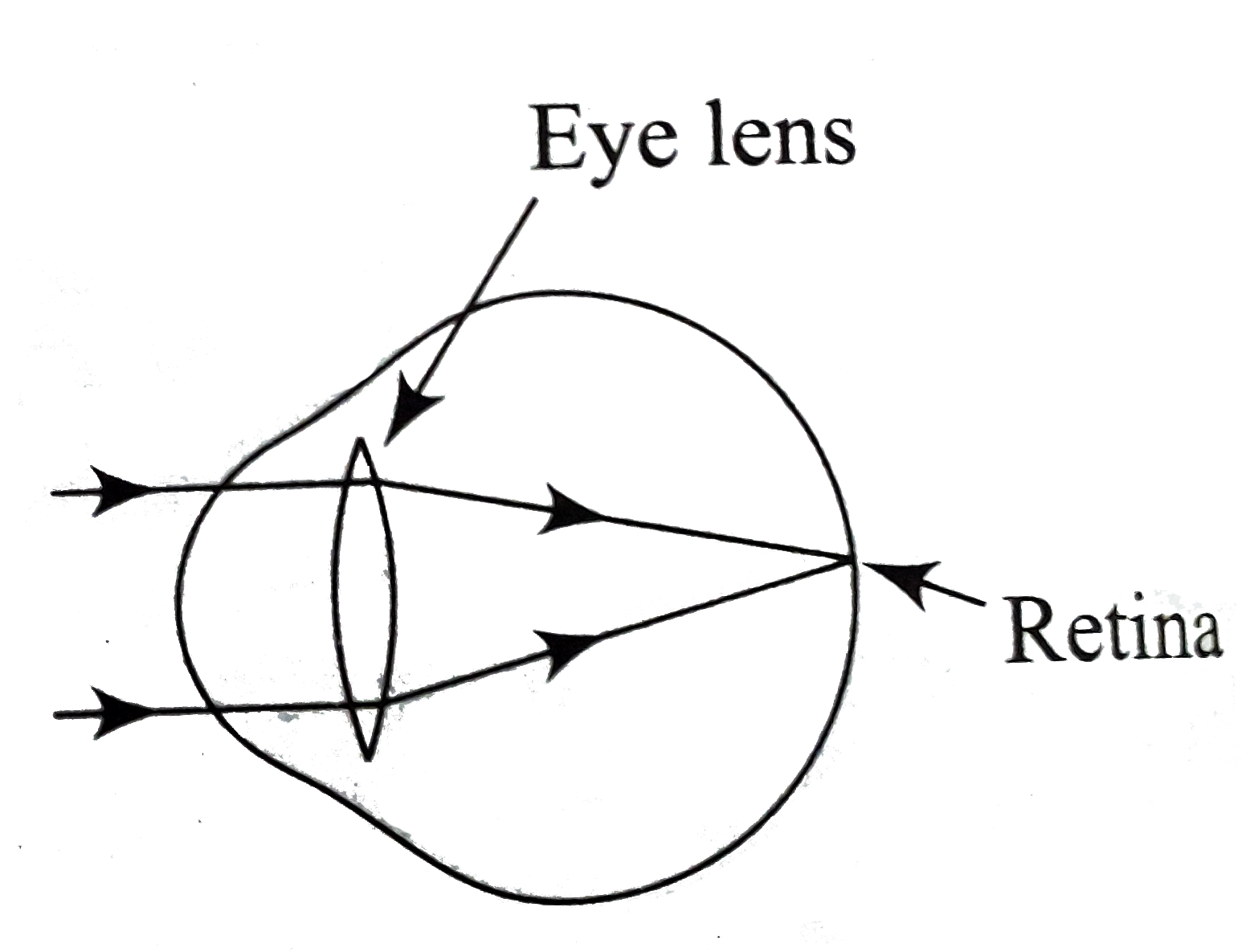
Q. A far sighted man connot see objects clearly unless they are at least 100cm from his eyes. The number of the spectacle lenses that will make his range of clear vision equal to an average grown up person will be
View SolutionThe ciliary muscles of eye control the curvature of the lens in the eye and hence can alter the effective focal length of the system. When the muscles are fully relaxed, the focal length is maximum. When the muscles are strained, the curvature of lens increases. That means radius of curvature decreases and focal length decreases. For a clear vision, the image must be on the retina. The image distance is therefore fixed for clear vision and it equals the distance of retina from eye lens. It is about 2.5cm for a grown up person.
A perosn can theoretically have clear vision of an object situated at any large distance from the eye. The smallest distance at which a person can clearly see is related to minimum possible focal length. The ciliary muscles are most strained in this position. For an average grown up person, minimum distance of the object should be around 25cm.
A person suffering from eye defects uses spectacles (eye glass). The function of lens of spectacles is to form the image of the objects within the range in which the person can see clearly. The image o the spectacle lens becomes object for the eye lens and whose image is formed on the retina.
The number of spectacle lens used for th eremedy of eye defect is decided by the power fo the lens required and the number of spectacle lens is equal to the numerical value of the power of lens with sign. For example, if power of the lens required is +3D (converging lens of focal length 100/3cm ), then number of lens will be +3.
For all the calculations required, you can use the lens formula and lensmaker's formula. Assume that the eye lens is equiconvex lens. Neglect the distance between the eye lens and the spectacle lens.
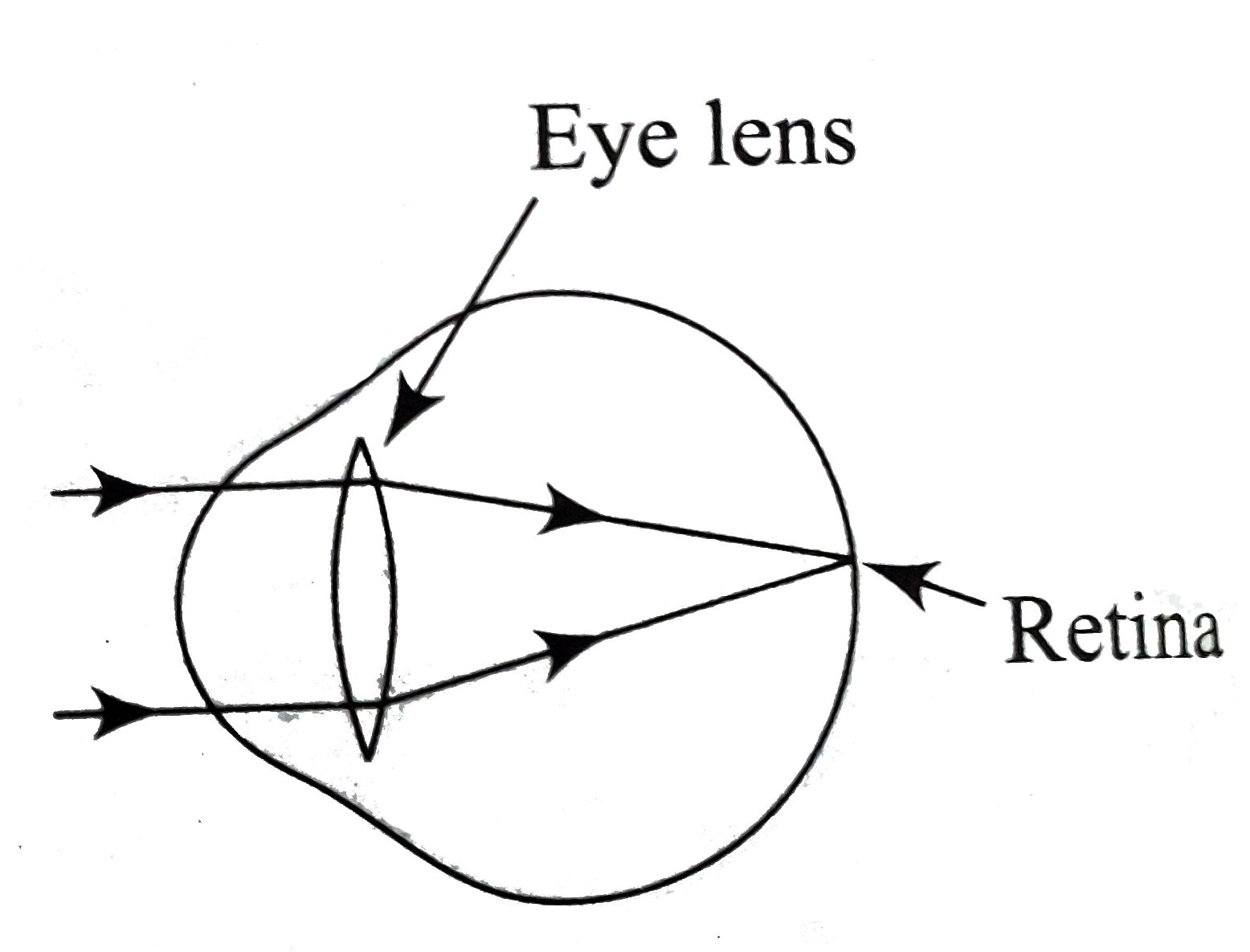
Q. Maximum focal length of a eye lens of a normal person is
View SolutionThe ciliary muscles of eye control the curvature of the lens in the eye and hence can alter the effective focal length of the system. When the muscles are fully relaxed, the focal length is maximum. When the muscles are strained, the curvature of lens increases. That means radius of curvature decreases and focal length decreases. For a clear vision, the image must be on the retina. The image distance is therefore fixed for clear vision and it equals the distance of retina from eye lens. It is about 2.5cm for a grown up person.
A perosn can theoretically have clear vision of an object situated at any large distance from the eye. The smallest distance at which a person can clearly see is related to minimum possible focal length. The ciliary muscles are most strained in this position. For an average grown up person, minimum distance of the object should be around 25cm.
A person suffering from eye defects uses spectacles (eye glass). The function of lens of spectacles is to form the image of the objects within the range in which the person can see clearly. The image o the spectacle lens becomes object for the eye lens and whose image is formed on the retina.
The number of spectacle lens used for th eremedy of eye defect is decided by the power fo the lens required and the number of spectacle lens is equal to the numerical value of the power of lens with sign. For example, if power of the lens required is +3D (converging lens of focal length 100/3cm ), then number of lens will be +3.
For all the calculations required, you can use the lens formula and lensmaker's formula. Assume that the eye lens is equiconvex lens. Neglect the distance between the eye lens and the spectacle lens.
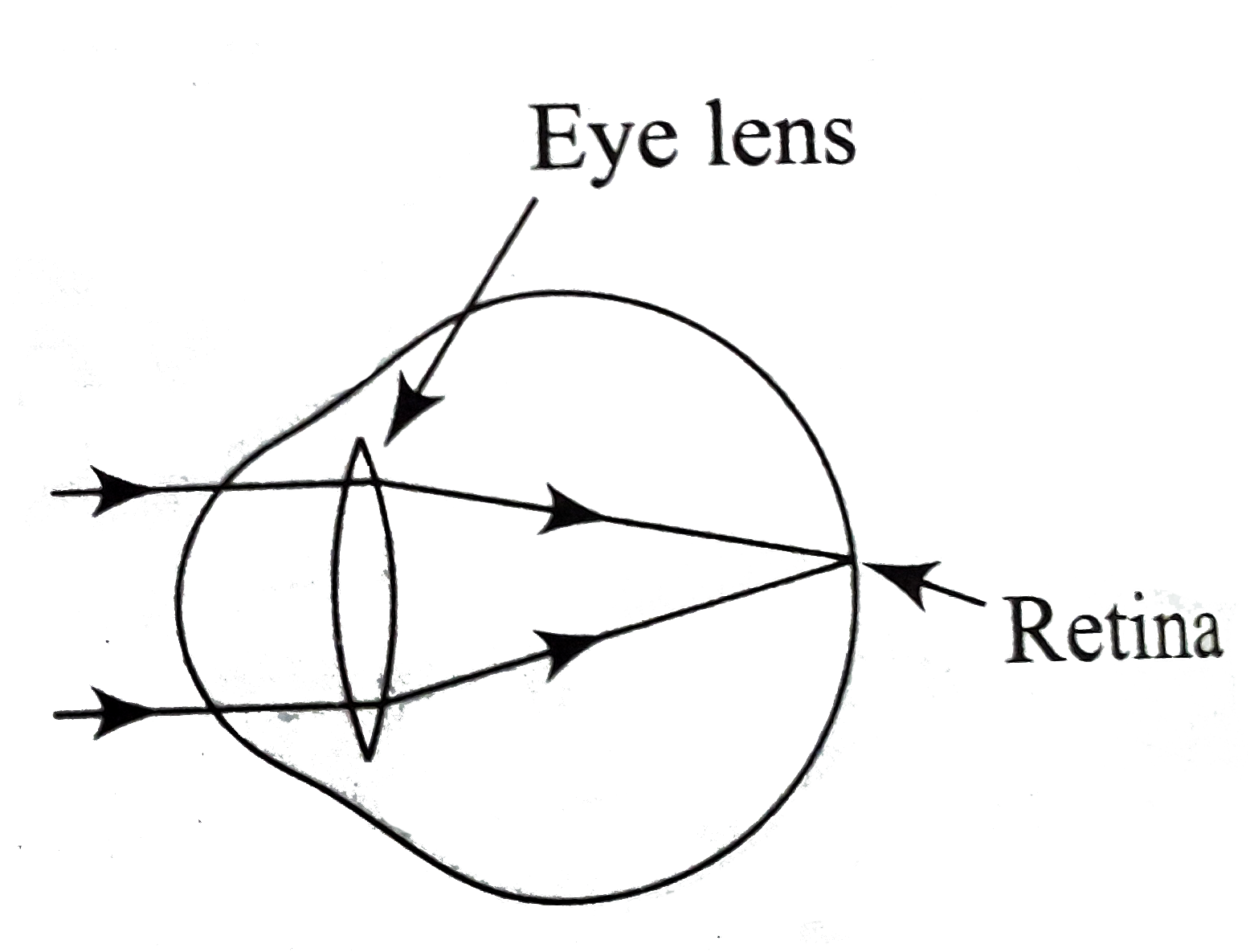
Q. Minimum focal length of eye lens of a normal peson is
View SolutionThe ciliary muscles of eye control the curvature of the lens in the eye and hence can alter the effective focal length of the system. When the muscles are fully relaxed, the focal length is maximum. When the muscles are strained, the curvature of lens increases. That means radius of curvature decreases and focal length decreases. For a clear vision, the image must be on the retina. The image distance is therefore fixed for clear vision and it equals the distance of retina from eye lens. It is about 2.5cm for a grown up person.
A perosn can theoretically have clear vision of an object situated at any large distance from the eye. The smallest distance at which a person can clearly see is related to minimum possible focal length. The ciliary muscles are most strained in this position. For an average grown up person, minimum distance of the object should be around 25cm.
A person suffering from eye defects uses spectacles (eye glass). The function of lens of spectacles is to form the image of the objects within the range in which the person can see clearly. The image o the spectacle lens becomes object for the eye lens and whose image is formed on the retina.
The number of spectacle lens used for th eremedy of eye defect is decided by the power fo the lens required and the number of spectacle lens is equal to the numerical value of the power of lens with sign. For example, if power of the lens required is +3D (converging lens of focal length 100/3cm ), then number of lens will be +3.
For all the calculations required, you can use the lens formula and lensmaker's formula. Assume that the eye lens is equiconvex lens. Neglect the distance between the eye lens and the spectacle lens.
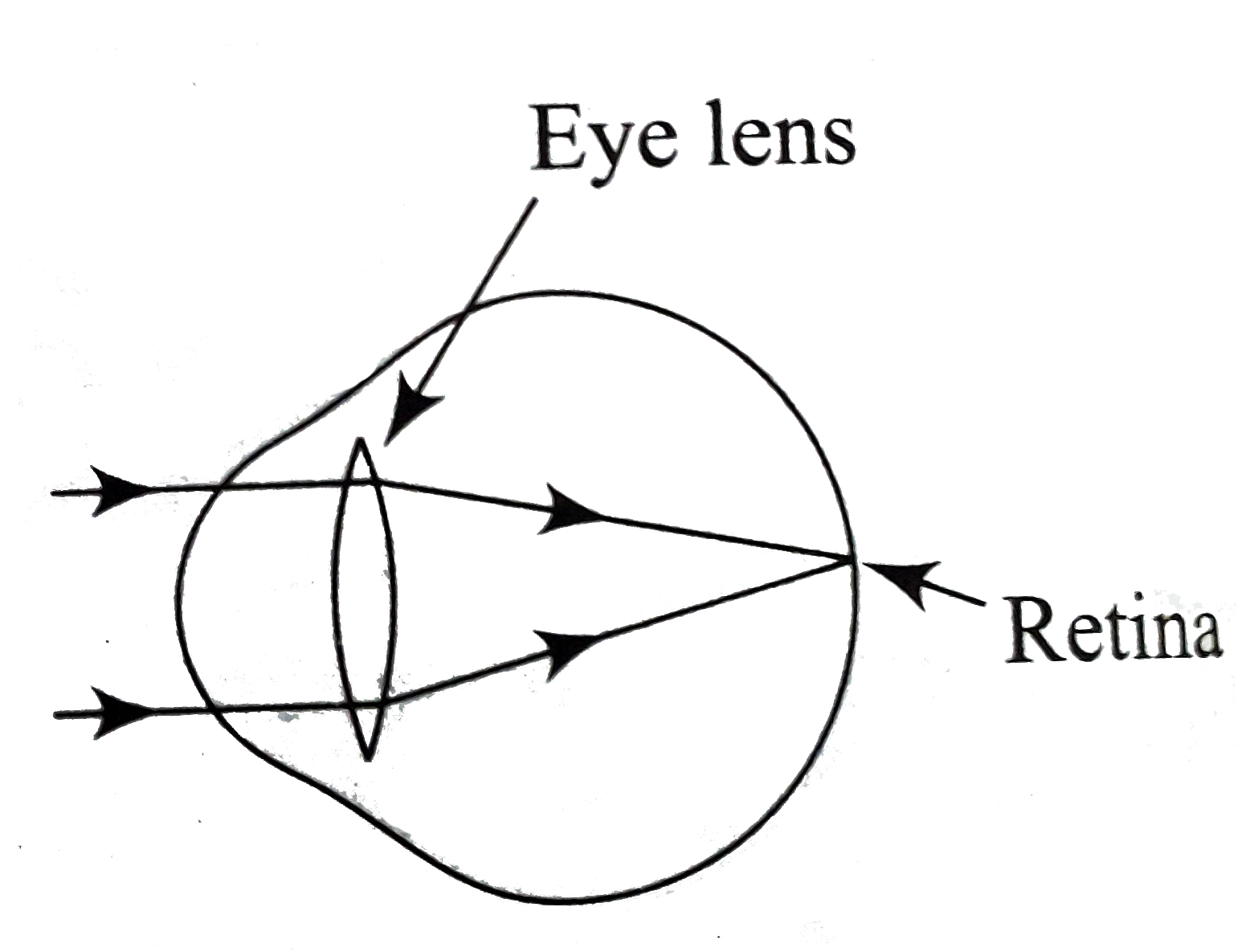
Q. A near sighted man can clearly see ojects only upto a distance of 100cm and not beyond this. The number of the spectacle lenses necessary for the remedy of this defect will be
View SolutionMolecules of the amino acids that comprise our proteins have the property of being non-super imposable on their mirror images because,. They are said to be chiral or possess 'handedness'. Most of the amino acids are of left handed form, but with no reasons available. Even more interesting recent experiments have shown that a 7-9% excess of four amino acids is present in Murchison meteorite discovered in 1970. This analysis shows life could arise outside the confines of earth. The origin of unequal distribution is probably because of electromagnetic radiations emitted in a corkscrew fashion from the poles of spinning neutron stars could lead to a bias of one mirror image isomer over another when molecules form in interstellar space.
A stereogenic carbon can be defined as a carbon atom bearing groups of such nature that an interchange of any two groups will produce a stereoisomer. The device that is used for measuring the effect of optically active compounds on plane polarized light is a polarimeter. The analyser in the polarimeter decides the activity of compound present. This is being decided on the basis of angle by which axis of analyser has to be rotated for complete brightness. Left, right or no adjustment decides l, d - activity or optical inactivity respectively.
Optically inactive isomer possessing chiral centres are categorized as
View Solution
